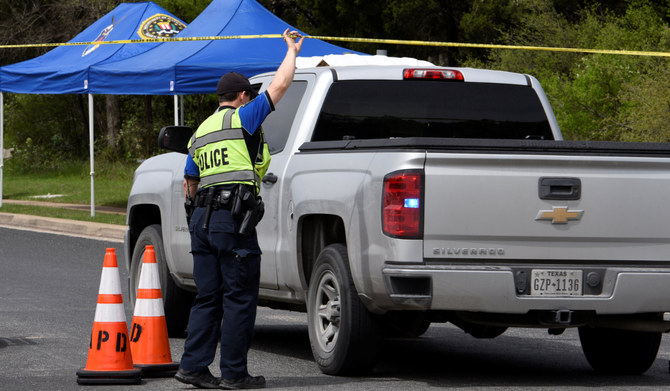DALLAS: A Texas woman allegedly tried to drown a 3-year-old at an apartment complex pool in suburban Dallas after making racist remarks toward the child’s mother in a case investigators are asking to be treated as a hate crime, a police spokeswoman said Monday.
Elizabeth Wolf, 42, has been charged with attempted capital murder and injury to a child. The child’s mother told officers that Wolf told the mother she wasn’t American, along with other racial statements, police said.
The mother of the children, who wears a hijab, said in a news release from the Texas chapter of the Council on American-Islamic Relations that they are Palestinians who became American citizens. Neither police nor CAIR have released the mother’s name.

Community leaders, including Texas Rep. Salman Bhojani and Mustafaa Carroll, a spokesperson for the Council on American-Islamic Relations, attend a news conference, Saturday, June 22, 2024, about an alleged hate crime that occurred in Euless, Texas. (AP)
Euless police Capt. Brenda Alvarado told The Associated Press that the department has requested that prosecutors in Tarrant County treat the case as a hate crime. A spokeswoman for the district attorney’s office said Monday that they have received the case and are currently reviewing it.
Police said in a statement that when officers arrived to a call about a disturbance between two women on May 19 in Euless, witnesses told officers that a “very intoxicated” Wolf had tried to drown a child and had argued with the child’s mother.
The child’s mother told officers that Wolf had been asking her where she was from and if the two children playing in the pool were hers, police said. The mother told officers that after she answered, Wolf tried to grab the woman’s 6-year-old son but he pulled away from her grasp, causing a scratch on his finger.
Police said that as the mother helped her son, Wolf grabbed the woman’s 3-year-old daughter and forced her underwater. The mother pulled her daughter, who was yelling for help and coughing up water, out of the pool, police said.
Medics evaluated both children, who were cleared.
Wolf has been released on bond. A call to her attorney was not immediately returned Monday.
On Saturday, community leaders came together to denounce the attack on the child and how the woman treated the family.
“The trauma and pain this has caused for the immigrant community broadly and Muslim community more specifically cannot be understated,” said state Rep. Salman Bhojani, whose district includes part of Euless.



























